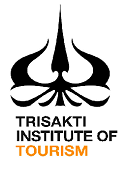Analysis of Potential Mountaineering Tourism in Mount Gede Pangrango National Park in West Java
Abstract
This study aims to determine the dominant factors in potential mountaineering tourism and analyze potential strategies in terms of SWOT. This research was using a combination of qualitative and quantitative methods. The strategy was analyzed using Strengths, Weaknesses, Opportunities, and Threats (SWOT) methods on indicators of natural tourist attraction in the form of land, accessibility, management and service, climate, facilities / infrastructure, availability of clean water, security, and marketing. Quantitative data was collected using a questionnaire with a Likert scale, while qualitative data was collected through observation, interviews, and documentation. Respondents for quantitative data were 100 tourists, and those for qualitative data were 21 informants consisting of technical field managers, communities, community climbers, and traveler. The results of the study showed an analysis of the potential of mountain climbing tourism in Mount Gede Pangrango National Park is quite potential and development strategy is needed. The findings in this study show SWOT matrix analysis of policy strategies for potential mountain climbing tourism in Mount Gede Pangrango National Park has the power and opportunity to develop more Progressive Strategy by making Mount Gede Pangrango National Park excellent mountain climbing tourism with its natural beauty and uniqueness.









